If there’s one central fact of Stephen King’s existence it’s this: he likes to write. The man has a genuine enthusiasm for putting words on the page that other bestselling novelists just don’t seem to share. J.K. Rowling appears to be almost exclusively focused on the world of Harry Potter and moving slower all the time, George R.R. Martin produces words the way most people pass kidney stones, and James Patterson farms out his writing to co-authors. But Stephen King genuinely enjoys sitting down every day and writing. He once gave an interview saying he writes every day except Christmas and his birthday. Later, he admitted that he actually works on those days, too.
This re-read covered 12 books King wrote in the first ten years of his career. Over that same period, he also wrote another novel, The Dark Tower: The Gunslinger; the short illustrated story, Cycle of the Werewolf; the long novella, The Mist; co-authored The Talisman with Peter Straub; wrote the screenplay for Creepshow; produced Danse Macabre, a book length non-fiction survey of horror; and turned out over a dozen short stories. He was writing so much that he even invented a second name, Richard Bachman, so that he could publish more books under another identity. Which didn’t necessarily turn out to be a good thing.
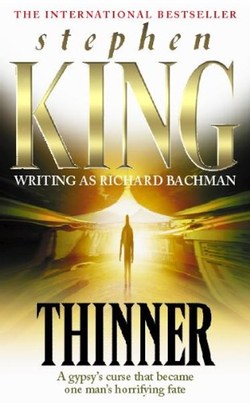 After the film version of Carrie came out in 1976 and sent King’s sales figures soaring, he decided that he wanted his earlier unpublished novels to see the light of day. He had three of them in his trunk and so he started trying to find a way to get them published. Doubleday had made it clear that they didn’t want to saturate the market by publishing more than one Stephen King book per year, so King sent Getting It On, the first book he’d sent to Doubleday, over to his paperback publisher, New American Library, telling them that he wanted to publish it under the name Guy Pillsbury. Elaine Koster, his editor, was delighted but as the manuscript passed around the house word leaked that it was by King. Irritated, King took it back and made some changes.
After the film version of Carrie came out in 1976 and sent King’s sales figures soaring, he decided that he wanted his earlier unpublished novels to see the light of day. He had three of them in his trunk and so he started trying to find a way to get them published. Doubleday had made it clear that they didn’t want to saturate the market by publishing more than one Stephen King book per year, so King sent Getting It On, the first book he’d sent to Doubleday, over to his paperback publisher, New American Library, telling them that he wanted to publish it under the name Guy Pillsbury. Elaine Koster, his editor, was delighted but as the manuscript passed around the house word leaked that it was by King. Irritated, King took it back and made some changes.
First, he retitled it Rage, then he changed his pseudonym to Richard Bachman, a combination of Richard Stark (the pseudonym Donald Westlake uses for his Parker novels) and Bachman-Turner Overdrive, whose album he was listening to at the time. His agent, Kirby McCauley sent the book back to NAL with the condition that no one was to know King was the author. Koster agreed, they published the book, and it died on the shelves. Released two months after King left Doubleday for NAL, Rage told the story of an armed teenager who takes over his high school classroom. The FBI has contacted King in the past when the book has been cited as a favorite of school shooters, and because of this King has let it go out of print.
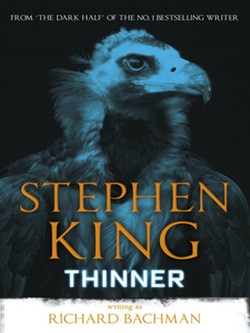 But King had three more novels in his trunk, all of them written before Carrie, and there was no reason not to continue releasing them. There was The Long Walk, a sci-fi story about a future where a grueling marathon walk is a public spectacle; Roadwork, about a man who has an armed stand-off with the police when his house is slated for demolition in a road building project; and The Running Man, another science-fiction story, this one about a massive manhunt staged as televised entertainment. The most popular of the bunch, The Long Walk, came out right after The Stand was released and it’s had three printings. Roadwork came out after Firestarter, and The Running Man was issued between Creepshow and Different Seasons. None of them sold very well.
But King had three more novels in his trunk, all of them written before Carrie, and there was no reason not to continue releasing them. There was The Long Walk, a sci-fi story about a future where a grueling marathon walk is a public spectacle; Roadwork, about a man who has an armed stand-off with the police when his house is slated for demolition in a road building project; and The Running Man, another science-fiction story, this one about a massive manhunt staged as televised entertainment. The most popular of the bunch, The Long Walk, came out right after The Stand was released and it’s had three printings. Roadwork came out after Firestarter, and The Running Man was issued between Creepshow and Different Seasons. None of them sold very well.
Finally, in 1983, King asked NAL if they would publish his new Bachman book, Gypsy Pie, in hardcover for once and put some marketing money behind it. Since King was making them millions, NAL agreed to indulge him. The title was changed to Thinner and NAL’s marketing team gave away thousands of copies at the Annual Booksellers Convention, and printed 50,000 hardcover copies, the biggest first run for Bachman yet. The reviews were good but the book was no hit, selling only 28,000 copies.
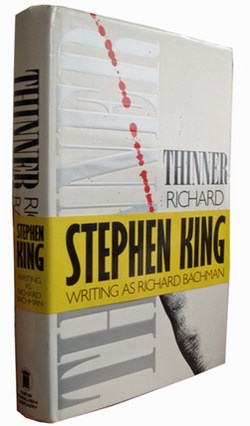 Then, Stephen Brown, a bookstore clerk in Washington DC, got suspicious. He felt Bachman’s writing style was incredibly close to King’s, so one lunch hour he headed over to the Library of Congress and checked the copyright info. All of Bachman’s books were registered to King’s agent, Kirby McCauley, which wasn’t any kind of smoking gun, so Brown kept pushing. Eventually he was shown the original copyright paperwork for Rage and there it was: copyright Stephen King, Bangor, ME. He wrote a letter to King and two weeks later got a call at the bookstore: “Steve Brown? This is Steve King. All right. You know I’m Bachman. I know I’m Bachman. What are we going to do about it? Let’s talk.” Thus began a three-night interview between Brown and King that Brown eventually published in the Washington Post. Even though Entertainment Tonight and the Bangor Daily News also broke the story, Brown’s piece in the Post was the only one featuring an extended interview with King himself. Despite saying that he was “pissed” to be exposed, King couldn’t argue that it was an entirely bad thing. Sales of Thinner jumped from 28,000 copies to 231,000.
Then, Stephen Brown, a bookstore clerk in Washington DC, got suspicious. He felt Bachman’s writing style was incredibly close to King’s, so one lunch hour he headed over to the Library of Congress and checked the copyright info. All of Bachman’s books were registered to King’s agent, Kirby McCauley, which wasn’t any kind of smoking gun, so Brown kept pushing. Eventually he was shown the original copyright paperwork for Rage and there it was: copyright Stephen King, Bangor, ME. He wrote a letter to King and two weeks later got a call at the bookstore: “Steve Brown? This is Steve King. All right. You know I’m Bachman. I know I’m Bachman. What are we going to do about it? Let’s talk.” Thus began a three-night interview between Brown and King that Brown eventually published in the Washington Post. Even though Entertainment Tonight and the Bangor Daily News also broke the story, Brown’s piece in the Post was the only one featuring an extended interview with King himself. Despite saying that he was “pissed” to be exposed, King couldn’t argue that it was an entirely bad thing. Sales of Thinner jumped from 28,000 copies to 231,000.
The Bachman episode would provide inspiration for King’s book The Dark Half, in which an author’s pseudonymous identity comes to life and torments him, but otherwise Bachman was dead. King would revive him again in 1996 for a new novel, The Regulators, and he would also release his last trunk novel, Blaze, in 2007 under the Bachman name. But, for the most part, King was done with Bachman, and that’s a good thing.
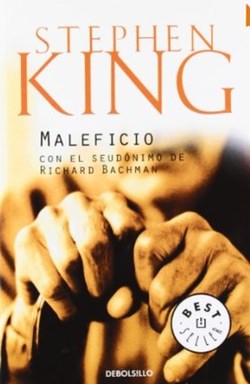 Thinner, released in 1984, is the only Bachman book besides The Regulators that didn’t start out with the name Stephen King on the manuscript. Unlike the other Bachman books it’s not science fiction or a thriller, it’s pure horror, but it shares DNA with the other Bachman books, including a grim, downbeat ending. King always went out of his way to give his books happy endings, but not the Bachman books. They were a place where he didn’t need to worry about his readership and could indulge his fantasy of being a penny-a-word pulp writer (namely Donald Westlake). Unfortunately, an author play-acting as another author isn’t a very satisfying thing, and while the Bachman books are all perfectly enjoyable reads, they books don’t hold up particularly well next to King’s other books. Thinner, in particular, is extremely weak.
Thinner, released in 1984, is the only Bachman book besides The Regulators that didn’t start out with the name Stephen King on the manuscript. Unlike the other Bachman books it’s not science fiction or a thriller, it’s pure horror, but it shares DNA with the other Bachman books, including a grim, downbeat ending. King always went out of his way to give his books happy endings, but not the Bachman books. They were a place where he didn’t need to worry about his readership and could indulge his fantasy of being a penny-a-word pulp writer (namely Donald Westlake). Unfortunately, an author play-acting as another author isn’t a very satisfying thing, and while the Bachman books are all perfectly enjoyable reads, they books don’t hold up particularly well next to King’s other books. Thinner, in particular, is extremely weak.
Billy Halleck is a high end lawyer in Chicago who is also an obese compulsive overeater. After accidentally running over an elderly gypsy woman he’s acquitted on the charge of vehicular manslaughter by a judge who is a personal friend, and a cop who lets the investigation slide. On his way out of the courtroom, the dead woman’s father touches Halleck’s cheek and whispers “Thinner.” Immediately afterwards the pounds start to drop from Halleck and, while he enjoys it at first, it quickly becomes life-threatening. After discovering that the judge is in hiding because he’s growing hard scales all over his body and that the cop’s face has been reduced to a bowl of bloody oatmeal by a virulent outbreak of acne, Halleck decides to find the gypsies and make them remove the curse.
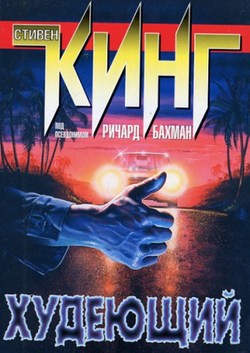 As his weight drops to a life-threatening point, Halleck asks his old mobster friend, Richie Ginelli, for help and this is where the book becomes King’s version of one of Westlake’s Parker novels. Told in a clipped, spare style, with every swapped license plate and hotwired car described in flat, relentless detail, Ginelli puts remorseless pressure on the gypsies as he wages a war of wills with them. Thinner becomes a Parker novel for people who don’t read Parker, and it feels about as authentic as Marie Antoinette dressing up as a shepherdess to play peasant. After a long series of pulp maneuverings, the gypsies relent and remove Halleck’s curse and put it into a pie, telling him that it will be passed on to the next person who eats it. Halleck wants to feed it to his wife, whom he feels has not stood by him through this ordeal, but when he gets home he throws the pie in the fridge and goes to bed. When he wakes up, he’s horrified to find that his daughter has had a slice. All sad, Halleck cuts himself a piece, too.
As his weight drops to a life-threatening point, Halleck asks his old mobster friend, Richie Ginelli, for help and this is where the book becomes King’s version of one of Westlake’s Parker novels. Told in a clipped, spare style, with every swapped license plate and hotwired car described in flat, relentless detail, Ginelli puts remorseless pressure on the gypsies as he wages a war of wills with them. Thinner becomes a Parker novel for people who don’t read Parker, and it feels about as authentic as Marie Antoinette dressing up as a shepherdess to play peasant. After a long series of pulp maneuverings, the gypsies relent and remove Halleck’s curse and put it into a pie, telling him that it will be passed on to the next person who eats it. Halleck wants to feed it to his wife, whom he feels has not stood by him through this ordeal, but when he gets home he throws the pie in the fridge and goes to bed. When he wakes up, he’s horrified to find that his daughter has had a slice. All sad, Halleck cuts himself a piece, too.
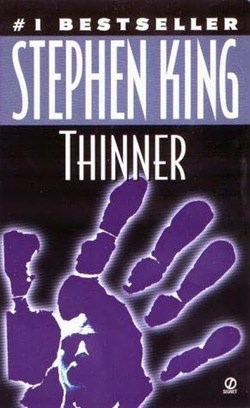 Thinner bears some of King’s unmistakeable stylistic trademarks, especially his tendency to interrupt sentences with italicized sentence fragments, reducing the Bachman identity to a disguise as thin as Clark Kent’s glasses. But, deprived of the responsibility of having his name on the cover, the book freed King to take less care, and the hallmark of Stephen King has always been the care he takes. King researches his subjects meticulously (how many people learned a lot about cars from Christine?), he takes the time to find the good in all of his characters, even his monsters, and he takes the care to inject his stories with a lot of literary ambition.
Thinner bears some of King’s unmistakeable stylistic trademarks, especially his tendency to interrupt sentences with italicized sentence fragments, reducing the Bachman identity to a disguise as thin as Clark Kent’s glasses. But, deprived of the responsibility of having his name on the cover, the book freed King to take less care, and the hallmark of Stephen King has always been the care he takes. King researches his subjects meticulously (how many people learned a lot about cars from Christine?), he takes the time to find the good in all of his characters, even his monsters, and he takes the care to inject his stories with a lot of literary ambition.
Cujo plays a long game with chance and coincidence that is the equal to anything considered literary fiction, and there are few authors who have revealed as much about their fears as King did in The Shining. Brett Easton Ellis may have thought he was breaking new ground with American Psycho, but King had found sympathy for the Devil years earlier with The Dead Zone. Without this level of care, without this attention to detail, without this ambitious striving to be more than “just” entertainment, we’re left with a readable book that’s a second-hand imitation of Donald Westlake. No matter how readable Thinner is, in the end it’s just a game of dress-up.
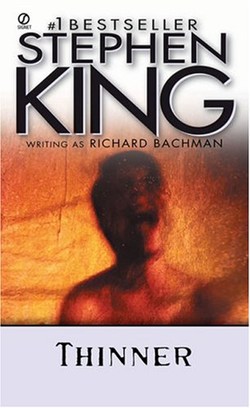 The book is heavy on guilt and responsibility, which was a theme King had previously explored in Pet Sematary, and it also contains a taste of Cujo’s themes of life being made up of a web of interconnected events. But whereas these deep thoughts were woven into every strand of Cujo and Pet Sematary, in Thinner they are literally spelled out when Halleck writes a letter to his wife saying, “When you look at things closely you start to see that every event is locked onto every other event…to believe in the curse is to believe that only one of us is being punished for something in which we both played a part. I’m talking about guilt avoidance…” The scene may as well have a sign over it: this is the book’s theme, start your interpretive essay here.
The book is heavy on guilt and responsibility, which was a theme King had previously explored in Pet Sematary, and it also contains a taste of Cujo’s themes of life being made up of a web of interconnected events. But whereas these deep thoughts were woven into every strand of Cujo and Pet Sematary, in Thinner they are literally spelled out when Halleck writes a letter to his wife saying, “When you look at things closely you start to see that every event is locked onto every other event…to believe in the curse is to believe that only one of us is being punished for something in which we both played a part. I’m talking about guilt avoidance…” The scene may as well have a sign over it: this is the book’s theme, start your interpretive essay here.
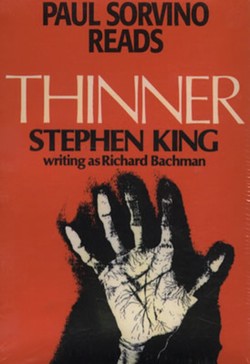 There’s a sloppiness throughout the book, and King admits to it when he says that for the gypsy’s Romany dialogue he simply lifted random lines from the Czech editions of his books, but that’s the least of it. After several chapters showing Ginelli behaving like an indestructible badass, Halleck leaves him in his car for 20 minutes and returns to find nothing but Ginelli’s severed hand. Apparently this unstoppable Terminator has been killed in broad daylight by a young gypsy woman and his body has been…eaten? Burned? Tucked away in a kangaroo’s pouch? Who knows? It’s equally improbable that after so much time and agony spent procuring Halleck’s gypsy pie, he would simply toss it in the fridge and go to bed. But why should King care if his name isn’t on the cover? Especially if he’s having so much fun pretending to be Donald Westlake?
There’s a sloppiness throughout the book, and King admits to it when he says that for the gypsy’s Romany dialogue he simply lifted random lines from the Czech editions of his books, but that’s the least of it. After several chapters showing Ginelli behaving like an indestructible badass, Halleck leaves him in his car for 20 minutes and returns to find nothing but Ginelli’s severed hand. Apparently this unstoppable Terminator has been killed in broad daylight by a young gypsy woman and his body has been…eaten? Burned? Tucked away in a kangaroo’s pouch? Who knows? It’s equally improbable that after so much time and agony spent procuring Halleck’s gypsy pie, he would simply toss it in the fridge and go to bed. But why should King care if his name isn’t on the cover? Especially if he’s having so much fun pretending to be Donald Westlake?
The result is a book that feels thinner (no pun intended) than King’s better books. Richard Bachman is King without his voice, and the result is flat. Rather than bringing a touch of literary aspirations to the horror novel, Bachman dumbs King down. Thinner is entertaining the way an EC horror comic is entertaining, but it’s not much more than that. There’s a reason it didn’t sell on its own: because it was no different than a million other mass market horror paperbacks with cutaway covers that were clogging up drugstore racks across the country.
Thinner aside, re-reading all these Stephen King books has been a pleasure and a surprise. I’ve been surprised at the way some of the books I never loved turned out to be so ambitious, and how some of the books that I clung tightly to as a teenager wound up leaving me empty (‘Salem’s Lot, I’m looking at you). If I had to go through the list and pick the books that disappointed me the most, in order of greatest disappointment to least, they’d have to be:
Christine—if King ever wrote a book that felt like a quick cash-in attempt, this is it.
Thinner—it’s King without the things that make me like King. Things like ambition, a love for his own characters, and a determination to take care with his craftsmanship.
‘Salem’s Lot—as much as I loved it as a kid, and as ambitious as it is, I just felt that it didn’t hold up over the years. Today, it feels like a collection of influences rather than a living, breathing novel.
“Rita Hayworth and the Shawshank Redemption” and “Apt Pupil”—there was nothing wrong with either of these but neither jumped off the page the way I remembered them doing the first time I first read them.
I’m going to leave The Stand off of this list. It’s a book a lot of people feel passionately about, and a book that I read several times in high school. But while I know it speaks to a lot of people, it’s just not for me anymore. That doesn’t mean it’s a bad book (unlike Christine, which is objectively bad) but it’s a book I feel I’ve outgrown. Pet Sematary feels the same way to me. As much as I admire what King’s doing, and as successful as I think the book is, it’s not a book I’ll ever think much about again or come back to, not because of any failings on its part, but simply because it’s no longer for me.
The happier surprise for me in this re-read was how many books I loved. Especially during his NAL years, King was pushing hard and trying something new, and it showed. In order of least to greatest, here’s how I felt about the rest of his books:
Carrie—this is one of those books where you understand why people were so excited when it came out. Deeply experimental in form, it also gave us King’s first truly sympathetic monster.
Firestarter—unjustly neglected, King’s most sexual book is also one of his best books about children.
“The Body” and “The Breathing Method”—two stories from Different Seasons that have held up incredibly well. “The Body” remains one of King’s best, and “The Breathing Method” is one of the few times he’s done pastiche so perfectly.
The Dead Zone—it’s sort of breathtaking to me that King was willing to write an entire book about a failed political assassin and still keep the reader on his side all the way through. King calls it his first “real” novel, and he’s not wrong.
The Shining—rarely has an author put his own personal nightmares on the page in this much detail. This is something of a highwire act for King’s own self-loathing, and it works.
Cujo—I was really, really, really surprised I liked this one so much. It’s everything that’s great about King and almost nothing that’s not-so-great. Ultimately it’s just the story of a good dog gone bad, but there’s so much more here that I’ve found myself haunted by it weeks later.
And that’s all she wrote. Later I may tackle Misery and It, but this covers the King canon. He may have gone on to write more books, and he may gone on to write better books, but these 12 are the ones on which his fame rests. And it was nice to discover that over half of them not only still hold up, they’re still capable of surprising me. If you’ve never read King, or if you haven’t re-read him in a long time, you could do a lot worse than to pick up Cujo or The Shining and start reading him all over again.
Grady Hendrix has written about pop culture for magazines ranging from Playboy to World Literature Today. He also writes books! You can follow every little move he makes over at his blog.










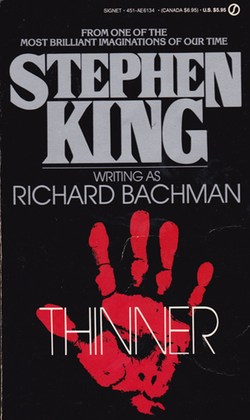
I can’t remember if I read this book, and I’m glad I didn’t, but I do want to say that Westlake is a terrific writer. The Parker books aren’t my thing, but I recognize the craft in the one I did read, and the Dortmunder books (which are the comic flip side) are some of my favorites ever.
Here is a good recent appreciation of Westlake’s overall career at Grantland, and here is a post by Jo Walton about the last Dortmunder book.
Not that you work for me or anything, but it would be nice maybe to do some of the more recent stuff, and see how it holds up.
Cell, I thought was kinda boring, and Kings reluctance to write a sad ending has left him pulling his punches and leaving them too ambiguous for me, and this one is the worst.
Duma Key, I thought was brilliant.
Lisey’s Story was worlds better than Rose Madder, which is probably the closest I can think of, as far as tone goes.
Under the Dome, his best book ever. As intricate as The Stand, without the scope, the way he flinched from the actual end of this story is its only flaw.
I had forgotten or didn’t notice that you were only doing 10 years. :( Please do cover It if they give you a chance to – despite the many years and a well documented love for the Dark Tower series, it remains my very favorite. Even with that scene in there.
I’ve really enjoyed this series. It brought back some good memories, and has given me a lot of insights into King’s writing. Thank you for writing it.
@2 Different strokes I guess. I thought Under the Dome was pretty mediocre. You could tell right from the start it was a book he wrote 40 years ago and just substituted “Iraq” for “Vietnam” and the end was a complete cop out.
If enough people write in BEGGING you to do more, can we just extend this blog to cover all of his books?! Huh?! HUH?!
Seriously wish this went on to cover Skeleton Crew, It, Needful Things, Gerald’s Game, The Green Mile, Desperation/The Regulators, and so many others.
Well, it’s been a lot of fun reading your take and reviews on these books. Though I also wish the Dark Tower novels, Bauchman books, and Cycle of the Werewolf had got thrown in there as well. Still, I’ve looked forward to this every week, thanks for sharing.
I agree with Kadere, do the rest of the books except for The Dark Tower since Suzanne is doing the read of it.
My thoughts on the books:
Carrie, I liked it, it was one of the first King books I had read and appreciated how different it was from the movie.
‘Salem’s Lot, I thought it was pretty good even though it was a bit long in the tooth. Haven’t read the expanded version though.
The Shining, I have to say one of his best out there.
The Stand, I tried to read this book but gave up after a couple hundred pages. I might go back one day.
The Dead Zone, Haven’t yet read but I want to read every book he’s written.
Firestarter, Have it, just haven’t read it yet.
Cujo, Creeped me out. Would’ve been better if it stayed focused on the whole car segments.
Christine, Haven’t read.
Pet Sematary, Haven’t read.
Thinner, I actually enjoyed this book very much. It’s like a b-movie popcorn flick in book form.
Night Shift and Different Seasons I have yet to get.
Outside of this list I have read: The Long Walk, The Running Man, Cycle of the Werewolf, Misery, Rose Madder, Cell, Under the Dome, part of Nightmares & Dreamscapes, and Everything’s Eventual. I own Dolores Claiborne and Lisey’s Story but haven’t gotten to them.
@5 The ending was a total cop out. But I honestly don’t think that the story has much to do with Vietnam, I thought it was very relevant to our current political climate vs the climate of that time.
I think this is a good place to stop, in fact.
I agree with the B-movie assessment of “Thinner”. What it needed was an editor! I think if someone could have pushed him on injustice to the Roma, or the mafia, or a marriage in a health crisis, it could have been a lot better. But it’s my impression that except the (necessary) pruning of “The Stand” no editor has actually pushed him. Maybe he’s uncooperative (I don’t know), but this reread has certainly given the impression that his ambitious work has all been his own ambition, and no editor has had the ambition to show him how and where to strenthen his own work.
I stopped reading him as a teenager at just about this point, because I got old enough to realize his characters and themes were really repetitive–and the reviews of “It” didn’t change my mind. (Many folks have said he got better a few books later, and I respect his book on writing quite a bit.) I can’t help but think he got some seriously lazy editors interested in bongo sales, lacking either the will or the skill to help him improve.
Yeah, I liked this re-read and am sad it won’t go farther. (Maybe skip some of the worse stuff like The Tommyknockers. I’d love to see something on The Talisman, even though that’s not only King.)
I really enjoyed the reread, reminded me of all the time I spent in middle and high school reading the scariest stuff I could find. If you decide to keep going, I’ll be sitting in the backseat for the ride! (though, if you’re looking for something a little different, I’d personally be down for a Dean R Koontz reread, too *koff*hint*koff*)
For those craving a continued re-read, there’s one going on on The Guardian (a UK newspaper) website in the books section. They’ve just got to Christine and apparantly the whole, or at least a very hefty part, of King’s books are going to be covered. Website is at guardian.co.uk
Good choices, Mr. Hendrix, good choices all around. I might shuffle the top of the deck a bit (pushing The Dead Zone further up), but that would just be a quibble among friends. I am happy, too, to see some lovin’ for Firestarter. Now, if I can only convince my monthly sf/f reading group to take a jaunt into King country.
I really liked both Rage and The Long Walk. Sure, they’re not quite up to King’s typical standard but I still found them to be excellent experiences. The Long Walk in particular really blew me away.
I can’t really imagine a Stephen King re-read that doesn’t cover It, since in many ways it’s the ultimate culmination of his earlier career. Not including It seems like skipping the series finale of a tv show. Misery, for all that I don’t particularly care for it, was the first of his novels to reach a wider audience. People who would never have considered reading “those trashy horror books” actually read Misery and allowed that Stephen King wasn’t all that bad.
Both books seem to be pretty important to his bibliography.
I’ve really enjoyed this series, and would love to see you continue. I know you hit the big ones, but not making it to “The Dark Half” –
which happens to be my favorite SK novel – and “It” is just a shame. I would love to see more! (but you can skip Tommyknockers :) )
Sadly, this is the weakest of the first bunch of novels “written by” Richard Bachman. “Rage” is a great study on teenage angst and alienation, “The Long Walk” is still one of his greatest stories, “Roadwork” may be my favourite with its classic King obsessive character driven by very sad nihilism, and “The Running Man” is just fun. This one… this one just isn’t very good.
It looks like this was a great adventure. I haven’t read all of the posts yet, but I certainly plan to at some point.
I have actually been doing my own King reading/blogging project. For those who would like the adventure to continue, feel free to check it out at
http://1pageatatime.wordpress.com/
I am not a professional writer by any means, just a King fan who is having some fun. I am doing all of his works and even watching the associated movies. The journey has been great so far, and it’s really just getting started.
You are completely wrong about Thinner. This is one of King’s best.
80% of King is unreadable garbage. Misery is by far his best, Cell is good, Thinner is good, Pet Sematary is good.
Anytime he writes straight forward genre, it works for what it is. Just waste-of-time entertainment. Thinner is a fun read.
When King gets pretentious and tries to write above his station, it’s just utter crap. I don’t know what moron would find anything in the Shining, for example. Laughable nonsense about hedges that turn into animals . . . Ooooo how terrifying.
I liked King better when he used to admit he made Big Mac quality work. I think it says something awful about the decline of our culture that he has published in the New Yorker.
Kinda funny that he criticizes King for lack of attention to detail, and then says the book takes place in Chicago when it’s actually Connecticut. :D